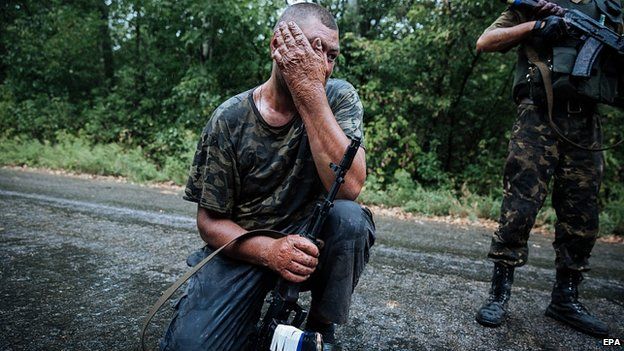Ukraine to seek Nato membership, says PM Yatsenyuk
-
Published

Ukraine's prime minister has said he will ask parliament to put the country on a path towards Nato membership.
Arseny Yatsenyuk said the government was sending a bill to MPs urging that Ukraine's non-bloc status be cancelled.
The remarks come as Nato holds an emergency meeting to discuss the crisis in eastern Ukraine.
The West has stepped up its accusations of direct Russian involvement in the conflict, following advances by pro-Russian rebels.
On Thursday Nato released satellite images it said showed Russian forces inside Ukraine. and said more than 1,000 troops were operating there.
Russia denies sending troops.
Nearly 2,600 people have been killed since April, the UN says, when Russia's annexation of Crimea prompted the rebels to take control of large parts of Donetsk and Luhansk regions in the far east of the country.
Non-aligned status
"The government is entering a bill to Verkhovna Rada [parliament] about the cancellation of Ukraine's non-bloc status and resumption of Ukraine's course for Nato membership," Mr Yatsenyuk said.
Ukraine's previous President Viktor Yanukovich, ousted earlier this year, enshrined the country's non-aligned status in the constitution in 2008.
At a government meeting, Mr Yatsenyuk said Ukraine's main aim remained membership of the European Union.
He said the bill that was being presented would also prevent Ukraine from joining any bloc that would stand in the way of this, meaning any economic union involving Russia.
Heavy fighting is continuing near Ukraine's strategic port of Mariupol, on the Azov Sea. Rebel forces are trying to capture the city but Ukrainian government troops are digging in.
On Thursday the separatists seized the nearby town of Novoazovsk.
The advance has raised fears that the Kremlin might seek to create a land corridor between Russia and Crimea - a territory annexed by Russia from Ukraine in March.
Rebels are also reported to have surrounded government soldiers in several places further north, near the city of Donetsk.
Ukrainian forces near the town of Ilovaysk say they are cut off and have been urgently asking for supplies and reinforcements.
Overnight, Russian President Vladimir Putin called on the rebels to open a "humanitarian corridor" to allow encircled Ukrainian troops to leave without unnecessary casualties, though he did not specify the location.
Rebel leader Alexander Zakharchenko later told Russian TV that his fighters had agreed to the request, on condition that the Ukrainians hand over heavy weapons and ammunition.
Ukraine security officials said in a statement that the proposal demonstrated that the rebels "are led and controlled directly from the Kremlin".
Human Rights Watch: "Abduction and torture cases are becoming more numerous"
At least 2,593 people had been killed in the conflict between mid-April and 27 August, the UN said in its latest report.
Human rights violations like abduction and torture were "committed primarily by the armed groups", referring to the rebels, it said.
Separately, Human Rights Watch said in a report that the rebels were subjecting civilians to torture, degrading treatment and forced labour.
'Not home-grown'
The reports of Russian troops fighting with rebels prompted renewed Western criticism of Moscow's role in the conflict.
US President Barack Obama blamed Russia for the escalation but stopped short of saying its troops had invaded Ukraine.
"There is no doubt that this is not a home-grown, indigenous uprising in eastern Ukraine," he said.
"The separatists are trained by Russia, they are armed by Russia, they are funded by Russia."
Mr Obama is due to discuss the crisis with European leaders at a Nato summit in the UK next week.
Nato released satellite images it said showed columns of Russian armed forces inside Ukrainian territory.
Nato Brigadier General Niko Tak said more than 1,000 Russian troops were operating inside Ukraine, both supporting the separatists and fighting on their side.
He told the BBC there had been a "significant escalation in the level and sophistication of Russia's military interference in Ukraine" over the past two weeks.
The Ukrainian and Russian ambassadors addressed an emergency session at the UN
Russian Foreign Minister Sergei Lavrov said no proof had been provided that Russia was directly involved.
"We're hearing various conjectures, not for the first time, but not once have any facts been presented to us," he told journalists.
At Thursday's emergency session of the UN Security Council, Russian Ambassador Vitaly Churkin accepted that there were Russian volunteers in eastern parts of Ukraine, but accused the Ukrainian government of "waging war against its own people".
War in eastern Ukraine: The human cost
- At least 2,119 people had been killed and 5,043 wounded since mid-April, a UN report on 7 August said
- 951 civilians have been killed in Donetsk region alone, the official regional authorities said on 20 August
- Official casualty counts only record certified deaths while in some particularly dangerous parts of the war zone, such as Luhansk region, victims are said to have been buried informally, for instance in gardens
- Rebels (and some military sources) accuse the government of concealing the true numbers of soldiers killed
- 155,800 people have fled elsewhere in Ukraine while at least 188,000 have gone to Russia.